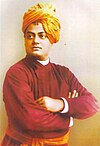National Youth Day (India): Difference between revisions
No edit summary |
|||
| Line 24: | Line 24: | ||
==External links== |
==External links== |
||
*[http://www.timesofbook.com/2013/01/national-youth-day.html National Youth Day] |
*[http://www.timesofbook.com/2013/01/national-youth-day.html National Youth Day] |
||
*[http://www.timesofbook.com/2013/01/swami-vivekananda-quotes.html Swami vivekananda quotes] |
|||
*[http://www.belurmath.org/national_youth_day.htm National Youth Day at Belur Math] |
*[http://www.belurmath.org/national_youth_day.htm National Youth Day at Belur Math] |
||
Revision as of 06:15, 8 January 2013
This article needs additional citations for verification. (December 2010) |

National Youth Day is celebrated in India on 12 January on the birthday of Swami Vivekananda. In 1984, the Government of India declared and decided to observe the birthday of Swami Vivekananda (12 January, according to the English calendar) as a National Youth Day every year from 1985 onwards. To quote from the Government of India's communication, 'it was felt that the philosophy of Swamiji and the ideals for which he lived and worked could be a great source of inspiration for the Indian Youth.'[1]
Celebration
Swami Vivekananda's birthday (12 January 1863),[2] according to the Indian Almanac (Vishuddha Siddhanta Almanac) is on Pausha Krishna Saptami tithi, which falls on different dates in the English Calendar every year (generally in the month of January). This is observed in various centres of Ramakrishna Math and Mission in a traditional Hindu manner which includes mangalarati (a kind of worship practised in India, specially by Hindu people), special worship, homa (fire-ritual), meditation, devotional songs, religious discourses and sandhya-arati (vesper service at evenings).
The National Youth Day is observed all over Jharkhand at schools and colleges, with processions, speeches, recitations, music, youth conventions, seminars, Yogasanas, presentations, competitions in essay-writing, recitations and sports on 12 January every year. Swami Vivekananda's lectures and writings, deriving their inspiration from Indian spiritual tradition and the broad outlook of his Master Sri Ramakrishna Paramahansa, are the source of inspiration and have motivated numerous youth organizations, study circles and service projects involving the youth.[3]
The National Youth Day is observed all over India at schools and colleges, with processions, speeches, recitations, music, youth conventions, seminars, Yogasanas, presentations, competitions in essay-writing, recitations and sports on 12 January every year.
Swami Vivekananda's lectures and writings, deriving their inspiration from Indian spiritual tradition and the broad outlook of his Master Sri Ramakrishna, are a source of inspiration and have motivated numerous youth organizations, study circles and service projects involving the youth. All his teachings can be found in The Complete Works of Swami Vivekananda, in nine volumes, published by Advaita Ashrama, Kolkata.
Activities
On the occasion, different people participate in several activities in all over India (and many parts of world as well) which promote youth in the field of education,art,culture and hope to generate moral values with enlightenment of inner soul.
On the occasion Mission Bhartiyam organises a two-day grand event in Uttar Pradesh of India for youths where more than a dozen activities take place for all age groups. The event is named Basti Yuvo Mahotsav. In fact, other government and non-profit organisations and corporate groups also celebrate in their way.
National Youth Festival (India) is an annual gathering of young people associated with National Youth Day. It includes cultural activities of both a competitive and non-competitive nature.
References
- ^ "National Youth Day". National Youth Day 12th January. Retrieved 6 October 2011.
- ^ http://en.wikipedia.org/wiki/Swami_Vivekananda
- ^ "National Youth Day, India" (PDF). National Youth Day. 12 January, 2009. Retrieved 6 October 2011.
{{cite web}}: Check date values in:|date=(help)

